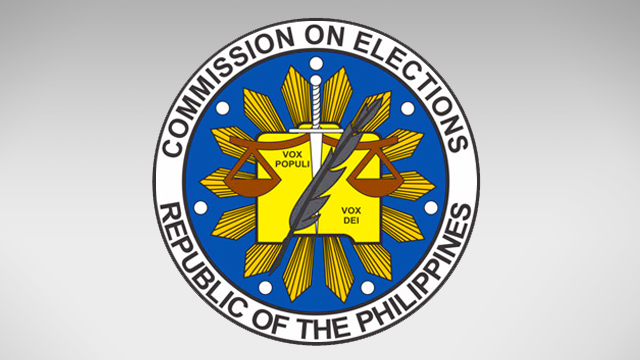SUMMARY
This is AI generated summarization, which may have errors. For context, always refer to the full article.

MANILA, Philippines (2nd UPDATE) – In an attempt to level the playing field for candidates in the 2016 elections, the Commission on Elections (Comelec) proposed an earlier start of the campaign period for both national and local candidates.
But some lawmakers argued that a longer campaign period may bring a number of complications in a candidate’s campaign.
The Comelec said it plans to set the first day of the campaign period to January 10, 2016, or 120 days before election day on May 9. It coincides with the start of the election period.
Currently, under Section 5 of Republic Act 7166, national candidates have a 90-day campaign period while local candidates have a shorter period, at 45 days.
The poll body said the proposal could help stop the premature campaigning of “epal” politicians, or those who blatantly advertise themselves through government projects and public service activities long before the start of the campaign period.
“This is a move by the Comelec against the epal candidates,” explained commissioner Christian Robert Lim on Monday, August 3.
The Comelec has admitted that it could not do anything against premature campaigning, because it can only enforce laws on campaign expenditures within the official campaign period. (READ: ‘Epal’ campaigning not an election offense – Comelec)
With the proposal to lengthen the campaign period to 120 days, the Comelec hopes to monitor the candidates’ campaign expenses as early as possible. If they overspent or commit illegal activities during the extended campaign period, “we want the candidate to have liability already,” Lim said.
“Ayaw namin ng epal (We don’t want ‘epal’ candidates),” he added.
“Epal” politicians are able to “campaign” outside that period because they are not deemed official candidates yet until the start of the campaign period, as promulgated in the Supreme Court ruling on the Penera vs Comelec case and provisions in Republic Act 9369.
Therefore, their expenses in “epal” advertisements could not be recorded yet as official campaign expenditures. (READ: Comelec: ‘Moral question’ hounds early campaigners)
Lim cited many cases in past elections where some candidates, especially at the local level, had been able to spend on premature campaigning and even illegal “vote-buying” activities as early as between January and March, outside the campaign period.
“Ang habol namin, kandidato na po kayo, nag-overspend kayo dahil maaga masyado, nangangampanya ka, idi-disqualify po namin kayo,” argued Lim.
(What we’re trying to achieve with this proposal is, if you’re deemed a candidate already, and you have overspent because you campaigned early, we will disqualify you.)
He added that the poll body has the flexibility, under Section 28 of Republic Act 8436, to fix the dates of pre-election activities.
Meanwhile, Lim said the candidates who might not afford to spend during the longer campaign period should not see the proposal as a roadblock.
“It is up to the candidate as to when or at what point in time he or she wants to spend money… [He or she could] campaign as early as January or as late as March,” Lim argued.
‘Not a triathlon’
In a statement on Tuesday, August 4, Senator Ralph Recto countered the Comelec’s proposal, saying that the clamor “is not to lengthen it, but to shorten it.”
“A campaign should be a short race, not the political equivalent of a triathlon,” he added.
He then listed down the implications of extending the campaign period. “[A] longer campaign translates into a costlier campaign,” the senator said.
“A longer campaign heightens tension, raises the political temperature that could reach violent boiling point,” he continued.
Recto also said that it would further distract incumbent officials from doing their duties, and would prolong the public works ban, which he said may delay the completion of needed infrastructure.
For his part, Valenzuela City representative Sherwin Gatchalian said that the proposal would only favor national candidates.
“It would be impossible for those running for president, vice president, and senator to go around the entire country for only 3 months or 90 days, as provided under the Omnibus Election Code,” Gatchalian said in a statement on Wednesday, August 5.
However, as for its impact on local officials, Gatchalian argued that the 120-day campaign period is “too long” and would be “counter-productive.”
“The Comelec should consider the difference in the nature of work between national and local officials. Mayors are one of the busiest local executives and giving them 120 days to campaign will be detrimental to his constituents,” said Gatchalian.
He suggested instead to increase the local bets’ campaign period to only 60 days, from the current 45 days.
The proposal on the extended campaign period was contained in the Comelec’s draft calendar of activities and omnibus rules on campaign finance for the 2016 polls, which the poll body presented in a public consultation on Monday in Intramuros, Manila. – Rappler.com
Add a comment
How does this make you feel?
There are no comments yet. Add your comment to start the conversation.